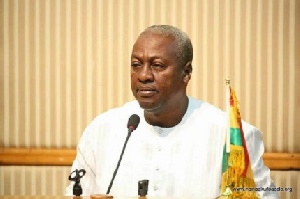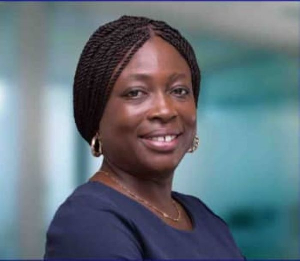Opinions of Monday, 24 July 2017
Columnist: K. Badu
Does Mahama’s government rank high among world’s most corrupt governments?
I made a few pronouncements during the 2016 electioneering campaign that the NDC founder, Ex-President Rawlings, a supposed proponent of probity, transparency and accountability, was not going to vote for Ex-President Mahama and the NDC Party due to the rot in his administration.
If we stroll down memory lane, before the birth of the NDC Party in 1992, the founder of the NDC Party (Rawlings), and his coup making friends vowed to purge off the alleged widespread sleazes, corruptions and social injustices in the country, which instigated their coup d’état in 1979.
In their hasty attempts to lustrate the country of the perceived needless maliciousness and injustices, they carried out what they termed “house cleaning exercise”,--they dealt with perceived offenders capriciously (instant justice).
The disgruntled coup makers proceeded with their intentions and callously exterminated eight prominent officers, whom they accused of committing sleazes and corruptions without trial.
Ironically, former President Rawlings is said to have founded the NDC Party based on the principles of probity, accountability and transparency. Yet sleazes and corruptions were so prevalent in his NDC government.
More so if we compared the alleged corrupt practices of the murdered army officers with the sleazes and corruptions which took place in the erstwhile NDC administration, we cannot help but to pronounce that the Generals were “shot for less”.
As a matter of fact, the corruptions reeked every facet of the erstwhile NDC administration, hence earning the famous epithet, ‘create loot and share’ government.
In fact, the corruptions and sleazes were so pervasive to an extent that the founder of the NDC Party grumbled openly: “I want to remind people that we could not have possibly forgotten that Generals were executed. The greed, corruption and injustice of today is a thousand times more than what these Generals were executed for, and if we are unable to restore a firm measure of integrity into our dealings, then the blood of many would have been shed in vain” (Rawlings 2017).
Despite their much touted “motif” of transparency, probity and accountability, we have been witnessing so much scheming guiles, sleazes and corruptions in the successive NDC administrations.
I will, however, dare state that the abhorrent practices were even worst in the erstwhile NDC administration.
As a matter of fact, the good people of Ghana woke up every morning to hear and read fresh news about damning sleazes and corruptions in the erstwhile NDC government.
Consequently, Ex-President Rawlings reminded the corrupt NDC officials: “Need I remind you that the NDC was built on principles and values that emerged as a result of circumstances that led to our birth?”
“The fallen heroes we honour today expect of us in the least, never to relapse into those same old days. But that has not been the case.
“In the wake of the revolution we made pronouncements that summed up the state of affairs that prevailed then.
“I admonished back then that; “Ghana should be a land where it will be accepted practice and norm that those who earn the privilege to govern, should administer in humility, conscious that they are the servants of the people and are ready to submit themselves and their actions to public scrutiny and accountability” (Rawlings, 2016).
Unsurprisingly, many observers hold a strong view that Ghana’s current economic meltdown emanated from the unbridled sleazes and gargantuan corruptions perpetrated by the officials of the outgone NDC administration.
Take, for example, despite the scarcity of resources, the Mahama administration spent over and above our means during the 2012 electioneering campaign, hence Ghana’s budget deficit and the total debt took an astonishing flight.
Consequently, three civil society organizations (the Ghana Integrity Initiative (GII), the Ghana Centre for Democratic Development (CDD-Ghana) and the Ghana Anti-Corruption Coalition (GACC) accused the then ruling government of National Democratic Congress (NDC) of using state resources for campaigning ahead of the 2012 December elections, arguing that it was a violation of Article 284 of the Constitution, which provides that "A public officer shall not put himself in a position where his personal interest conflicts or is likely to conflict with the performance of the functions of his office" (GII, CDD-Ghana and GACC 2012, 1, 3).
Their report said: “In the first two months of monitoring, the coalition uncovered various incidents of abuse of incumbency and electoral corruption.
Unbelievably, the NDC apparatchiks have been committing the same crimes (sleazes and corruptions) their party founders killed many innocent people for.
To me, there is nothing wrong for any individual to identify him/herself as an exponent of transparency, probity and accountability. But it somehow seems extremely hypocritical when a group of people who claim to be the exponents of such ethos would then turn around and dip their hands into the national coffers as if there is no tomorrow.
Aren’t the NDC apparatchiks claiming to be the preachers of transparency, probity and accountability?
So why are they refusing to practice what they have been preaching to us all these years?
Let us face it, former President Mahama and his government’s disastrous economic management sent Ghana’s economy deeper and deeper into the mire.
Thus some schools of thought contend that it was due to former President Mahama’s poor leadership qualities that a GH9.5 billion debt in 2009 ballooned to an incredible GH122.4 billion in just eight years.
In addition, the critics maintain that former President Mahama’s errors in judgement accounted for Ghana’s economic downslide. Take, for example, Ghana’s GDP shrunk from $47 billion to $37 billion in just five years.
Apparently, Ex-President Mahama and his NDC government’s dreadful decision-making met severe criticisms, when they abysmally dragged an economic growth of around 14 per cent in 2011 to a nauseating 3.6 per cent as of December 2016.
Moreover, the sceptics argue that former President Mahama and his government’s woeful economic management and alleged corrupt practices resulted in excessive public spending, less efficient tax system , needless high public deficit and destabilization of national budgets, heightened capital flight and the creation of perverse incentives that stimulate income-seeking rather than productive activities.
On the whole, the critics contend that former President Mahama’s government ranks high among the world’s worst governments, and, remains the worst ever in Ghana’s history.
To be quite honest, I hate to admit the apocalypse of the unbridled bribery and corruption cases, but I am afraid, Ghana may not see any meaningful development, so long as we have political parties whose members primary objective is to enrich themselves through the national purse.













